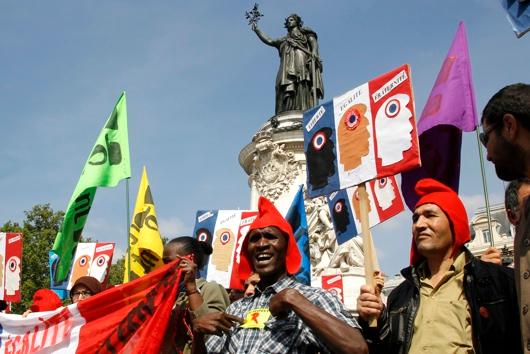EU’s free movement principles tested by Sarkozy’s expulsion of Gypsies
French opposition parties, unions, and civil rights groups protest President Nicolas Sarkozy’s expulsions of Gypsies and Roma people at the Place de la Republique in Paris, September 4, 2010.
Top News:The French round up of hundreds of Romanian and Bulgarian Gypsies who were promptly sent back to their homeland has tested the limits of the European Union’s key principle allowing citizens of all 27 member nations to circulate freely within the whole EU.
Images of Gypsy camps being broken up and families packed off on flights to the Balkans have provoked widespread outrage in much of Europe against the policy launched by President Nicolas Sarkozy. The issue has dominated headlines around the continent with the Vatican, United Nations human rights campaigners and even members of Sarkozy’s own party all expressing concern.
In fact the EU’s freedom-of-movement rules are not without restrictions. Although citizens enjoy passport free travel within the bloc, they can be moved on after three months in their new country if they don’t have a job or the means to sustain themselves. In addition, transitional arrangements for new members of the union allow other nations to restrict the right to work of Romanians and Bulgarians who joined the EU in 2007.
An EU panel set up to look into the mass expulsions has however suggested that Paris breached the union’s rules by treating the Gypsies as a group rather than responding to individual cases. France has defended its position saying that criminals and beggars must be deported for security reasons. Support from Silvio Berlusconi’s government in Italy and from right wingers in central Europe have prompted some to question if Europe is becoming increasingly intolerant of its minorities.
The EU received some advice on how to handle immigration from an unlikely source. On a visit to Rome, Libyan leader Moammar Gadhafi said the EU should pay his country at least €5 billion a year to stop illegal migrants from sub-Saharan Africa crossing the Mediterranean to create a “black Europe.” For good measure Gadhafi also suggested that Europe should convert to Islam. EU officials pointed out that it is already running programs with several African nations, including Libya, to help stem the flow of immigration, but they rejected the €5 billion demand.
The costs of setting up the EU’s new foreign service has raised concerns in Britain, where one newspaper reported that dozens of EU diplomats would be earning more than Prime Minister David Cameron. The EU counters that the External Action Service will actually save costs in the long run by allowing nations to pool diplomatic resources. The new service was also come under fire from several of the EU nations in eastern Europe who fear that it will become an old boy’s club dominated by western officials.
Money: Slovakia faced accusations of undermining European solidarity when its new government pulled out of the EU’s plan for a €80 billion rescue package for Greece. Slovakia’s contribution of €700 million was hardly essential for the Greek bailout, but EU officials and other nations in the euro-currency zone were furious at the Slovak decision dropping hints that there would be a price to pay next time the central European nation finds itself in need of EU assistance.
Meanwhile there were signs that Greece was emerging from the financial meltdown which had threatened do drag down Europe at the beginning of this year. The European Commission said austerity measures introduced by the Greek government in the face of street protests are beginning to bear fruit and urged other EU nations to take the necessary action to bring their public finances under control.
Growing optimism on the European economic front was given a big boost from Germany, where export led growth exceeded expectations. The EU’s biggest economy is set to grow at 3 percent this year the highest for years while unemployment fell for the 14th month in a row.
The German growth is based in no small part on exports to China’s still booming economy and has given a fillip to the whole euro-zone, but economists and government officials are cautioning against any euphoria as the recovery remains fragile, particularly amid lingering fears of a double-dip recession in the United States.
Meanwhile Europe faced more danger signs closer to home with concern mounting over the Irish economy as Dublin is forced to struggle with the mounting costs of keeping debt-ridden banks afloat. The bill for rescuing Anglo Irish Bank is estimated at €25 billion while fears that if the country’s third largest bank were to go under a loss of investor confidence could drag down other financial institutions around Europe.
Elsewhere: Fights over cheese are not uncommon in Europe Union.
Greece battled long and hard battle with Germany and Denmark to ensure that only its salty, white sheep or goat’s cheeses can be sold under the name feta. Poland and Slovakia fought over exclusive rights to oscypek cheese produced up on their mountainous border.
In the latest dairy duel, France was vanquished by Switzerland in the Gruyere war. After a three-year battle, French producers were force to admit that their legal arguments had more holes than their hard, yellow cheese and agreed that their Swiss neighbors (whose cheese is hole-free) could be granted the coveted Appellation d’Origine Contrôlée quality mark granting them international recognition for the cheese.
We want to hear your feedback so we can keep improving our website, theworld.org. Please fill out this quick survey and let us know your thoughts (your answers will be anonymous). Thanks for your time!
